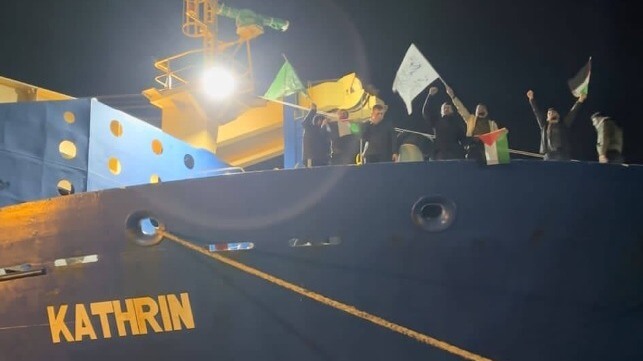Video: Turkish Pro-Palestinian Protestors Stage Sit-In on German Cargo Ship

A group of pro-Palestinian protestors stormed the cargo ship Kathrin while the ship was docked in Istanbul on Sunday, November 4, and attempted to stage a sit-in to call attention to their demands that Turkey close loopholes permitting trade with Israel. The group repeated the ongoing allegation that the vessel is or has transported explosive material to Israel.
The protestors who were reported aligned with the Anatolian Youth Association climbed fences and were able to get aboard the Kathrin which was docked in Istanbul’s Port of Haydarpasa. They posted videos and photos online including of the group on the bow of the vessel waving the Palestinian flag.
Members of the group had been staging a protest at the port for more than a month. They claim Turkey has blocked aid vessels from going to Gaza after in May 2024 suspending all trade with Israel. Turkey trades with the Palestinian Authority but there have been growing allegations in Turkey that many of the shipments which must go to Israeli ports under the guise of trade with Palestinians are being diverted to Israeli interests. Other accusations have said although Turkey reports suspending trade with Israel, that companies are sending their goods via ferries to Greece and elsewhere as intermediaries to get goods to Israel.
The Anatolian Youth Association and other activist groups said they have been tracking ships and movements from Turkish ports. Last week, they sought to disrupt the port call of a Zim vessel. The Youth Association alleges that an Evergreen-managed containership Uni-Phoenix (19,300 dwt) departed last week from Turkey bound for Israel. It is currently in Piraeus, Greece. Another Turkish-owned cargo ship Medkon Isik (3,000 dwt) they allege is also loading goods bound for Israel.
Turkish police responded to Sunday night’s protest and told the individuals who had boarded the Kathrin to disperse. They had been calling for the ship to depart while also saying that they would remain aboard to prevent any cargo operations. Those that did not leave the ship were detained and media reports said 16 people would be appearing in an Istanbul court Monday afternoon.
Problems have followed the cargo ship since it departed Vietnam in July with reports surfacing that it was transporting explosive material to Israel. Countries in Africa and Eastern Europe denied docking permission before the ship went into a port in Albania and then on to Egypt. Human rights groups alleged the containers with the explosives were still aboard or possibly offloaded in Egypt, an accusation the Egyptian Army denied. They said they were not assisting the Israelis but the ship docked at a military pier to offload cargo for the Egyptian military. Despite protests, Egypt said it permitted the vessel to depart when it filed papers showing its destination as Turkey.
The German managers of the vessel responded to Reuters last week saying the vessel was never booked to sail to Israel. The activists who hounded the ship for months admitted that they did not know how the explosives they believed were aboard would reach Israel, but they succeeded in getting Portugal to revoke the ship's registry (it was moved to Germany) and from docking in multiple ports. German authorities last week declined to get involved saying the material aboard was not from Germany and as such did not require their export license.
The Kathrin currently remains in the anchor at Istanbul.








 File photo: Ahmet Turk (centre), the removed mayor of Mardin, pictured at a press conference in Istanbul on August 29, 2019. © Bulent Kilic, AFP file photo
File photo: Ahmet Turk (centre), the removed mayor of Mardin, pictured at a press conference in Istanbul on August 29, 2019. © Bulent Kilic, AFP file photo

